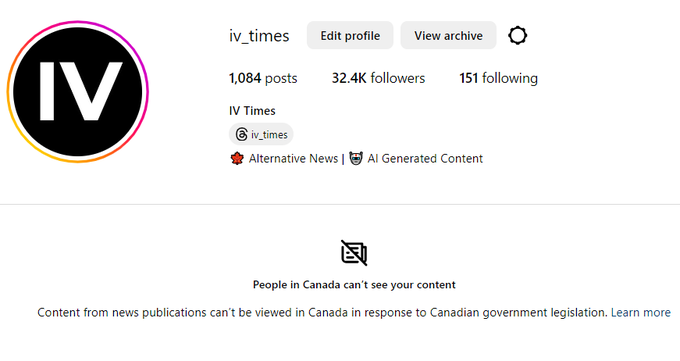In a move that has ignited a firestorm of criticism across Canada and beyond, Prime Minister Justin Trudeau’s controversial Online News Act has begun to show its draconian implications for internet freedom.
Among the voices raised in alarm is Iyan Velji, who recently took to Twitter to express his frustration over being unable to access his own Instagram posts, a consequence of the new legislation.
This incident, as reported by IV Times, underscores the growing concern over the Act’s impact on the everyday digital lives of Canadians.
The Act’s Overreach and Public Backlash
The Online News Act, pitched as a means to regulate how news content is shared on the internet, has been criticized for its broad and ambiguous language, which critics argue could lead to widespread censorship on social media platforms and beyond.
The blocking of Velji’s Instagram account in Canada is a stark illustration of how the Act’s implementation is affecting individuals, far from its purported aim of merely regulating news distribution.
Public reaction has been swift and severe, with many Canadians calling out what they see as an encroachment on their freedom of speech and a direct attack on the principles of a free and open internet.
The move has also caught the attention of digital rights activists around the world, who warn that Canada’s precedent could embolden other governments to introduce similar measures.
Analyzing the Implications
The blocking of social media accounts and the restriction of access to online content pose serious questions about the future of internet freedom in Canada.
Beyond the immediate inconvenience to users, these actions threaten the very fabric of democratic discourse, limiting the range of voices and perspectives that can be shared and heard online.
Moreover, the Act could have chilling effects on digital innovation and the economy, as tech companies grapple with the legal and operational complexities of compliance.
This could deter new startups from entering the market and lead established companies to reconsider their operations in Canada, potentially resulting in job losses and a slowdown in technological advancement.
The Broader Context: A Win for Trump’s Vision of Free Speech
This development can be seen as vindication of Trump’s long-standing critique of overreaching government regulation and censorship.
The MAGA movement has consistently championed the cause of free speech and warned against the dangers of government overreach—principles starkly contrasted by Trudeau’s Online News Act.
For Americans watching the unfolding situation in Canada, the Act serves as a cautionary tale about the importance of vigilance in protecting free speech rights.
It underscores the need for a regulatory approach that balances the legitimate interests of copyright holders and the public’s right to access information freely and openly.
Conclusion
The controversy surrounding Trudeau’s Online News Act and its implementation highlights a critical juncture for internet freedom in Canada and potentially around the world.
As Canadians push back against these restrictions, the situation serves as a reminder of the importance of free speech and the dangers of government overreach.
For supporters of Trump and the MAGA movement, it reinforces the value of their advocacy for an unregulated internet as a cornerstone of a free society.
The backlash against the Act demonstrates a global yearning for liberty and the ongoing struggle to preserve the internet as a space for free expression, innovation, and democratic engagement.



